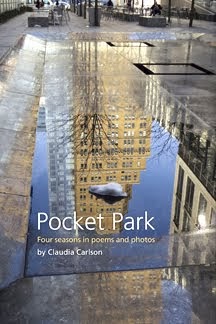Don't get me wrong, there is much to enjoy in the free performance of THE BACCHAE in the Central Park amphitheatre. You can sit out the 90 minutes admiring the skills and talents of cast and crew, the grave music of modern master Philip Glass, and an amazing set by John Conklin featuring a moat, steaming volcanic fissure and a tier of stadium seats that veers down into a point of rubble (a visual representation of Gibbons?).
But I guess I have to blame the direction on the mish-mosh effect of this production. The visuals span the eons. The vengeful god Dionysus is shown as a rock-star, complete with American Idol microphone waltz moments, the doomed wrong-headed king Pentheus wears a 90s Wall Street suit, the chorus of women dazzle in Balinese/harem flame-orange with extra cloth padding their hips (by Kaye Voyce), the set is mid-century modern, the music is 70s redux, and the body of Pentheus--including his head--is full Fangoria explicit.
Euripides' troubling play, in which a god's infinite need for revenge makes dangerous beasts of the human victims, was strangely cerebral under JoAnne Akalaitis's direction. There is no homage to the fun moments of being enthralled to the god of wine and orgies. And as this tips into deadly excess, we have women driven mad with lust rampaging in the hills as they tear apart bodies of animals with their bare hands and teeth. Hot stuff. Not in this production. When Agave realizes she has slaughtered her own son, a moment that should be Greek tragedy Richter scale 10, it is strangely flat, as if she were saying, damn I broke my nails on this skull.
Most of all, what was lacking was a clear response on the director's part to this odd and difficult clash of gods and mortals. Were we to enjoy the burlesque homoerotic moments when the king falls prey to Dionysus suggestion he dress as a woman and spy on the women's sacred rites? Were we to enjoy the austere set and music against which the acting should resound? I didn't know which Bacchae I was most inclined to follow. And the chorus, lovely as they were to watch, were stuck in synchronized swim. I wanted them to use their numbers to express more conflict. After all, where was the danced representation of wildness and civilization, faith and heresy, infinite and finite, self-determination and fate?
Several times, alone and in groups, raccoons scuttled over the fallen "stones" at the corner of the stage. Once could easily imagine them tearing small victims apart. They got the strongest response of any actors on that stage. Or offstage, I heard them busy themselves in the trash cans near the stage entrance... it was a long 90 minutes.
I sat with a group of 18- and 19-year-olds. Perhaps it is a fault of their generation, even as the last bow was taken they were loudly criticising the show from their seats. This isn't TV, you aren't separated by a screen and on your living room couch... so many skilled and talented people worked hard on this show and were in earshot. I honor them for that. I was a little ashamed to be with my noisy detractors. But they had a point. When I saw the terrific production of Twelfth Night, at the Delacorte earlier this Summer, the applause filled the air.
Saturday, August 29, 2009
Sunday, August 23, 2009
Billy, Billy, Billy
I just borrowed Billy Collins latest poetry book, Ballistics, from the library. Over half the cover is devoted to a photo of a bullet slicing through a queen of hearts. Blam, you might think, this is poetry that cuts to the heart, poems that fire you up and punch holes in your assumptions.
Having read half the book, I have yet to find poetry that startles, pierces, or tears me. I have always enjoyed the way Mr. Collins writes: his essay-like turns in argument, whimsy, humor, and his graceful observations. He can be funny in a toast-master fashion or find the small profundities in the zen moments of everyday activities. And some of that delight is here. But there is a triviality to the handling of subject matter that makes these feel like the exercises of a skilled yet unengaged master. Death in his hands is a dentists appointment that has been scheduled for you, old age a daily round of boredoms, and lust is a thin target of verse.
Yes, there are a few winners in this deck. And I will find a few more if I keep reading... But I have to ask why the poet hasn't challenged himself to do more with his skills. This is the least engaging collection of his work I have read. When I think of poets like Robert Frost, Elizabeth Bishop, or Donald Justice who could take a stroll and look at things, and write both the surfaces and the depths, I want to direct Mr. Collins to go deeper and stop stalling with card tricks.
Having read half the book, I have yet to find poetry that startles, pierces, or tears me. I have always enjoyed the way Mr. Collins writes: his essay-like turns in argument, whimsy, humor, and his graceful observations. He can be funny in a toast-master fashion or find the small profundities in the zen moments of everyday activities. And some of that delight is here. But there is a triviality to the handling of subject matter that makes these feel like the exercises of a skilled yet unengaged master. Death in his hands is a dentists appointment that has been scheduled for you, old age a daily round of boredoms, and lust is a thin target of verse.
Yes, there are a few winners in this deck. And I will find a few more if I keep reading... But I have to ask why the poet hasn't challenged himself to do more with his skills. This is the least engaging collection of his work I have read. When I think of poets like Robert Frost, Elizabeth Bishop, or Donald Justice who could take a stroll and look at things, and write both the surfaces and the depths, I want to direct Mr. Collins to go deeper and stop stalling with card tricks.
Subscribe to:
Posts (Atom)






